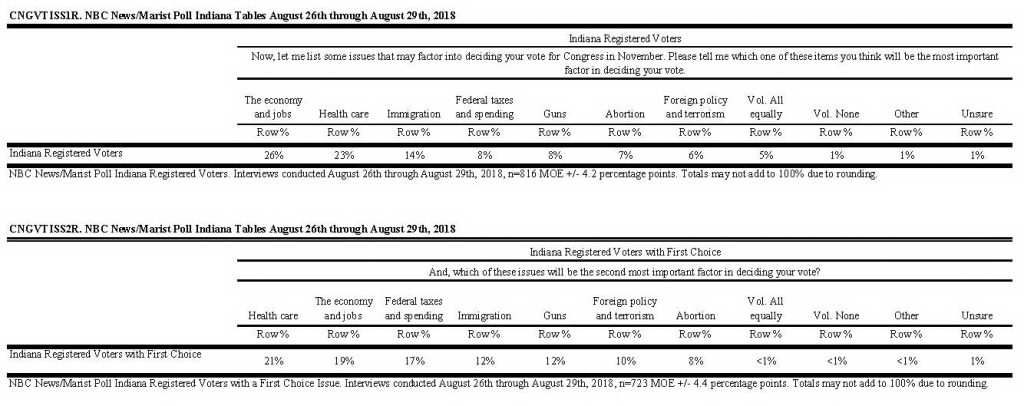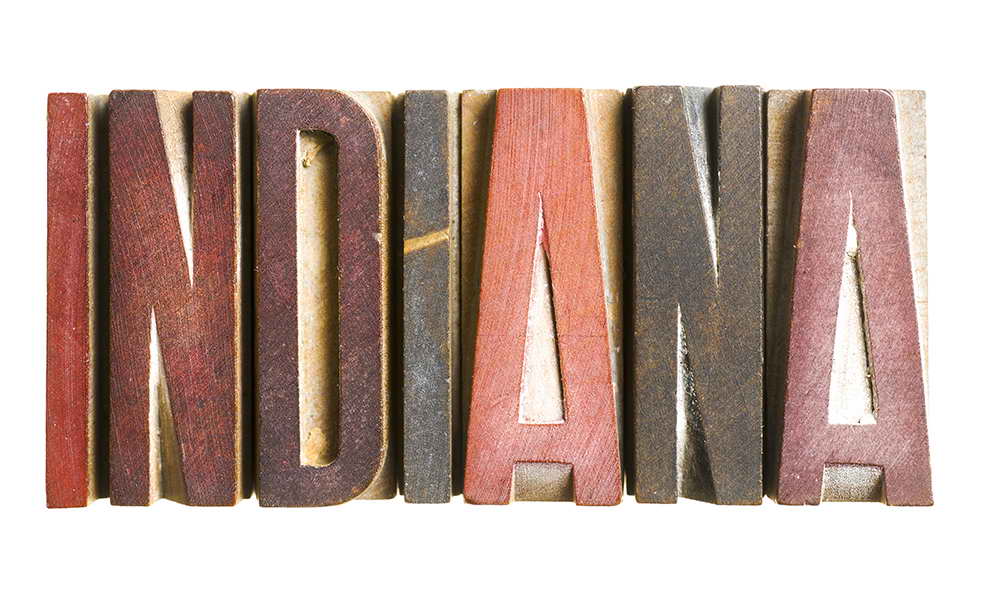September 6, 2018
Indiana Senate Race, Sep 2018
NBC News/Marist Poll
Indiana independents are down on the president and the majority say their vote will send a message that more Democrats are needed to balance the power of President Donald Trump. Yet Republicans still have an advantage on the generic ballot question in Indiana and on the question of congressional control. Among likely voters, only three points separate incumbent Democrat Joe Donnelly and Republican Mike Braun in a multi-candidate contest for U.S. Senate in Indiana.
“In what is largely a Republican state, the GOP’s advantage is being somewhat offset by independents who are dissatisfied with President Trump,” says Dr. Lee M. Miringoff, Director of The Marist College Institute for Public Opinion. “Right now independents are providing an opening for the Democrats in the state.”
47% of voters, including 54% of independents and one in ten Republicans, report their midterm vote will send a message that more Democrats are needed to serve as a check and balance on President Trump. 41% say their vote will signal more Republicans are needed to pass the Trump agenda including only 27% of independents who share this view. Majorities of voters under 45 years old (55%), including 60% of those under 30, and women (54%) consider their vote to be a call to balance President Trump’s power. Pluralities of those age 45 and older (48%) and men (46%) say more Republicans are needed to advance the president’s agenda.
A plurality of voters in the Hoosier State (45%) prefer a Congress controlled by Republicans. 40% would like the Democrats in power, and 15% are unsure. Partisan allegiances are intact. But among independent voters a plurality (41%) prefer Democratic control of Congress, and only 33% prefer Republican control. More than one in four independents (26%) are unsure.
On the congressional generic ballot question, 47% of Indiana registered voters report they are more likely to support the Republican in their district while 42% are more likely to support the Democrat on the ballot. Again independents play a key role. 45% of independents support the Democratic candidate while 35% support the Republican. 15% are undecided. Majorities of men (54%) and voters age 45 or older (51%) favor the Republican. Women (48%) including 49% of white women with a college degree and voters under 45 years of age (47%) are for the Democrat.
68% of Indiana registered voters, including 77% of Democrats and 71% of Republicans, consider this year’s midterm elections to be very important. Voters under 30 years old (50%) are the least likely to have this view.
In the contest for U.S. Senate in Indiana, Donnelly (44%) and Braun (41%) are closely matched among likely voters statewide including those who are undecided yet leaning toward a candidate. Libertarian candidate Lucy Brenton receives 8%. Six percent are undecided.
But only 49% of likely voters with a candidate preference for U.S. Senate say they strongly support their choice of candidate. 54% of Donnelly’s supporters, compared with 48% of Braun’s backers, express a firm commitment to their choice of candidate.
In a two-way contest, Donnelly (49%) has a six-point lead over Braun (43%) among Indiana likely voters.
“Donnelly scored an upset in 2012 against a flawed Republican opponent,” says Dr. Lee M. Miringoff, Director of The Marist College Institute for Public Opinion. “This time he faces a competitive contest against businessman Mike Braun. Right now support for both candidates is lukewarm.”
Neither Donnelly nor Braun is well defined in Indiana. 44% of Hoosiers, including 48% of likely voters, have a favorable view of Donnelly, 29%, including 31% of likely voters, have an unfavorable one, and 27% of residents, including 21% of likely voters, have either never heard of Donnelly or are unsure how to rate him.
34% of adults statewide, including 39% of likely voters, have a positive impression of Braun. 29%, including 32% of likely voters, have a negative view of him, and 37%, including 29% of likely voters, have either never heard of Braun or are unsure how to rate him.
The economy and jobs is the key voting issue for 26% of Indiana voters. Health care (23%) follows. 14% mention immigration. Nearly four in ten Democrats (37%) and 27% of independents say health care is the most important issue in determining their vote. The economy and jobs is the motivating issue for 28% of Republicans.

Among voters who mention a top issue in deciding their vote, 21% of voters say health care is the second most important issue in determining their candidate choice. 19% mention the economy and jobs. 17% say federal taxes and spending, 12% mention immigration, 12% cite guns, 10% say foreign policy and terrorism, and 8% mention abortion.
41% of residents think raising tariffs and barriers on imports from other countries will raise the cost of consumer goods and hurt the U.S. economy. 28% believe an increase will protect American jobs and help the U.S. economy. 18% say there will be no impact on the economy as a result of raising tariffs and barriers on foreign imports.
Hoosiers divide about President Donald Trump’s job performance. 44% approve including 27% who strongly approve. 47% disapprove including 36% who strongly disapprove. Nine percent are unsure. 39% of independents approve of the job Trump is doing as president including only 21% who strongly hold this view. A majority of independents (54%) disapprove of the president’s performance in office which includes 41% who strongly hold this opinion.
Trump’s favorable score is upside down. 42% have a favorable view of the president and 51% have an unfavorable one. Eight percent are unsure. Independents are a net negative 21 points in their opinion of Trump.
Complete September 6, 2018 NBC News/Marist Poll Release of Indiana
Complete September 6, 2018 NBC News/Marist Poll of Indiana (Tables of Adults and Registered Voters)
Complete September 6, 2018 NBC News/Marist Poll of Indiana (Tables of Likely Voters)

